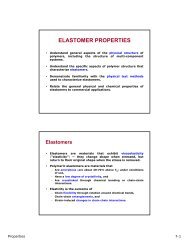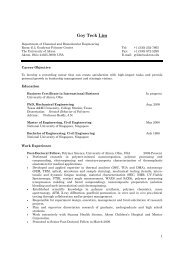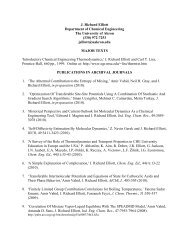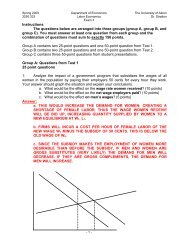Sociology of the Anarchists - Gozips.uakron.edu - The University of ...
Sociology of the Anarchists - Gozips.uakron.edu - The University of ...
Sociology of the Anarchists - Gozips.uakron.edu - The University of ...
You also want an ePaper? Increase the reach of your titles
YUMPU automatically turns print PDFs into web optimized ePapers that Google loves.
CrimethInc 29 , and interacted more with <strong>the</strong> general population, <strong>the</strong>y would find that <strong>the</strong>y<br />
need to make anarchism a mainstream idea/tendency, not a separatist one. For fur<strong>the</strong>r<br />
examples <strong>of</strong> “no compromise” with Earth First! see Lange (1990).<br />
Functionalism/Durkheimian<br />
<strong>The</strong> notion <strong>of</strong> a collective conscience is central to Emile Durkheim's writing, a form <strong>of</strong><br />
“pre-contracted solidarity”. Durkheim uses, for instance, <strong>the</strong> work <strong>of</strong> Rousseau and his<br />
idea <strong>of</strong> a “general will” to understand solidarity and non-economic interests. Rousseau<br />
believed that society could be advanced by people talking out <strong>the</strong>ir differences, finding<br />
common ground, and thus uniting. Although this is considered a bit naïve by anarchists—<br />
those in power are not willing to discuss lessening <strong>the</strong>ir powers unless <strong>the</strong>y are somehow<br />
endowed with altruism or are up against a wall—it still has relevance to <strong>the</strong> general<br />
optimism <strong>of</strong> anarchists that humans can generally be trusted to understand <strong>the</strong> problems<br />
<strong>of</strong> <strong>the</strong> world given <strong>the</strong> proper information to do so. Flowing from Rousseau's general will<br />
would be <strong>the</strong> idea and method <strong>of</strong> “consensus decision making”, which most anarchist<br />
affinity groups and collectives operate on. Consensus can be seen as <strong>the</strong> syn<strong>the</strong>sis <strong>of</strong> both<br />
self-determination and solidarity, since once a general will (a common goal or politic) is<br />
accepted by a group <strong>of</strong> people, a non-hierarchical way is considered best to overcome<br />
differences in solving problems.<br />
Ano<strong>the</strong>r sizable French influence upon Durkheim was Montesquieu, who emphasized <strong>the</strong><br />
inter-connectedness <strong>of</strong> all social phenomena: social, economic, religious, political, etc.<br />
This view is very compatible with anarchism, which also sees all sectors <strong>of</strong> modern<br />
society as interlocking institutions which ei<strong>the</strong>r reinforce each o<strong>the</strong>r or can be modified to<br />
work against each o<strong>the</strong>r. For instance, anarchist believe <strong>the</strong> equalization <strong>of</strong> economic<br />
standing will bring greater political equality. <strong>The</strong> more fair our political institutions deal<br />
with <strong>the</strong> issues <strong>of</strong> race, gender, and sexuality <strong>the</strong> more fairly cultural and social<br />
institutions will reflect. And so on. (An artistic rendition <strong>of</strong> this idea can be seen in <strong>the</strong><br />
poster created by <strong>the</strong> Federation <strong>of</strong> Revolutionary Anarchist Collectives (FRAC-GL)<br />
which shows a brick being thrown into a system <strong>of</strong> gears bearing <strong>the</strong> following labels:<br />
war, capitalism, fascism, white supremacy, government, patriarchy, and homophobia.<br />
[Insert graphic <strong>of</strong> this poster as a “figure”?] )<br />
Herbert Spencer's monograph “<strong>The</strong> Social Organism” contrasted human societies with<br />
living organisms (<strong>the</strong> “organic analogy”) and greatly influenced Durkheim. <strong>The</strong><br />
similarities to Kropotkin's “Mutual Aid” study should not be lost: Kropotkin<br />
demonstrated how mutual aid tendency ran through animal species and through various<br />
stages <strong>of</strong> human societies. Durkheim differs with Spencer in that he rejects <strong>the</strong> idea <strong>of</strong><br />
“contractual solidarity”. <strong>Anarchists</strong> also echo this sentiment, saying that <strong>the</strong>re is a deeper<br />
basis <strong>of</strong> society than a “market system”, one based upon morality. Durkheim says precontractual<br />
solidarity comes from trust. Even where <strong>the</strong>re is no immediate trust between<br />
people (people who do not even know each o<strong>the</strong>r), anarchists suggest that <strong>the</strong>re can be<br />
and <strong>of</strong>ten cases is a good will between people.<br />
29 For a critical review <strong>of</strong> CrimethInc (2000), see Ryan (2004).<br />
[ Williams 29 ] [ this is a draft. do not cite. ]






